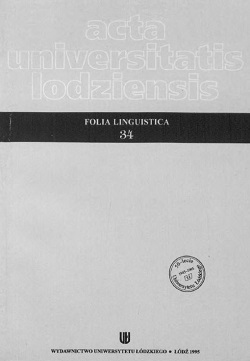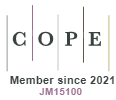Mechanizmy analogii słowotwórczej (na materiale czasowników)
DOI:
https://doi.org/10.18778/0208-6077.34.07Abstrakt
The author discusses the word-formative processes, as a result of which the lexical rangę of the Polish language is being extended. The examples used are the latest Polish verbs which have recently appeared in mass-media – in the press and in the radio and TV programmes e.g. dowartościować, odlodzić, przepolitycznić, ukoszernić, ukościelnić, zadekretować, zniesmaczyć, etc.
A common feature of these verbs is the way of formation – verbalization of two- or multi-word phrases involving at least two word-formative operations whose formal exponent is a prefix together with a suffix, and, if necessary, the reflexive pronoun „się” functioning as a word-formative morpheme. The formative present in these verbs consists of at least two word-formative morphemes divided by a base – hence the author calls it a divided formative In such derivations suffix verbalizes the noun, and the meaning of the new verb is provided by prefix, which occurs in the model verb forming a part of word-formative paraphrase e.g. dodać wartości (to add value) = dowartościować, odczyścić pas startowy z lodu (ta clear the runway of ice) = odlodzić, uznać wódkę za koszerną (to consider vodka as kosher) = ukoszernić, zagwarantować/zapewnić dekretem (to guarantee with a decree) = zadekretować. In many cases there is – on the one hand – something that might be called automatic duplication of the model verb, and – on the other hand – a mechanism of word-formative analogy, as a resuit of which a whole series of new derivatives is created, e.g. the verb odlodzić is connected with the verbs odczyścić, odśnieżyć, odwodnić, odgruzować, etc.; the verb przepolitycznić is connected with such derivatives as przepełnić, przeludnić, przejaskrawić, etc.; the verb ukościelnić is connected with such verbs as upaństwowić, uspołecznić, upowszechnić, and others.
Some new verbs could have been formed also as a result of exchange derivation of the prefix, often on the basis of the formation of antonymic form, e.g. zawojować (to conquer) - odwojować (to reconquer), zadłużyć (to involve in debt) - oddłużyć (to pay debt), odciążyć (to relieve of burden) - dociążyć (to increase burden). This point cannot be unequivocally decided in the cases which involve the presence of word-formative paraphrase containing a verb with the same prefix.
Pobrania
Pobrania
Opublikowane
Jak cytować
Numer
Dział
Licencja

Utwór dostępny jest na licencji Creative Commons Uznanie autorstwa – Użycie niekomercyjne – Bez utworów zależnych 4.0 Międzynarodowe.










